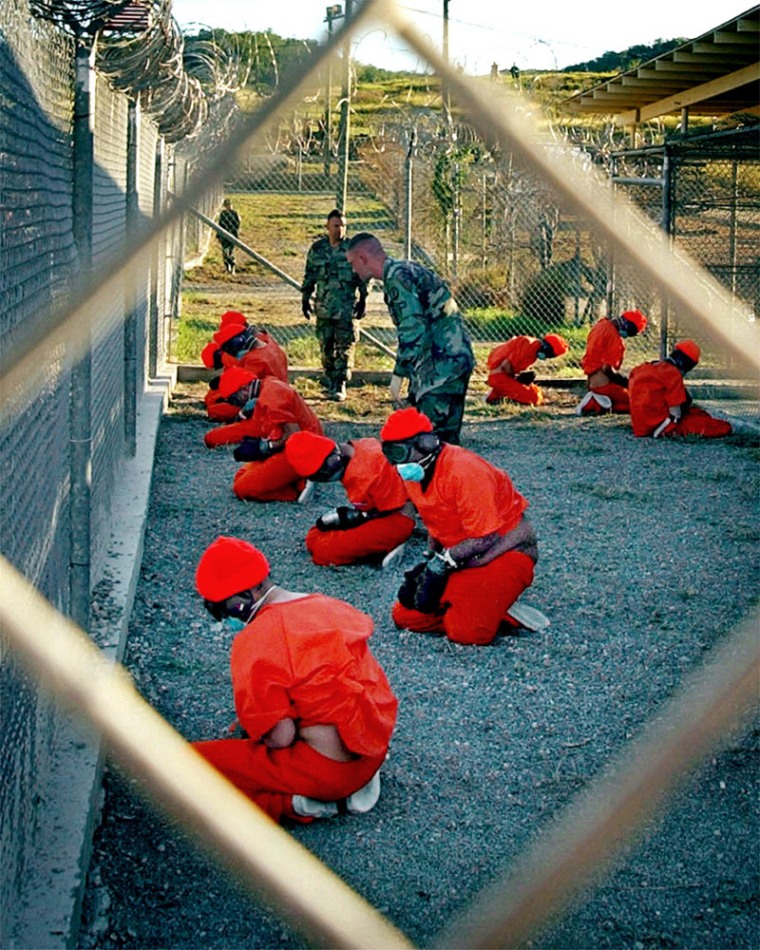In a tense hour-long argument before the Supreme Court on Tuesday, a lawyer for detainees captured in Afghanistan and now imprisoned at the U.S. Naval Base in Guantanamo Bay in Cuba urged the justices to give the prisoners the right to challenge their detention in federal courts.
Representing British citizen Shafiq Rasul, lawyer John Gibbons argued that the Bush administration sought to “create a lawless enclave” at the Guantanamo base, which has been leased from Cuba since 1903 but remains sovereign Cuban territory. “It is so totally artificial to say that because of the provisions in the lease the executive branch can create a no-law zone where it is not accountable to any judiciary anywhere. ... What the executive branch is saying here is, ‘We don’t have to account to anyone anywhere.'”
If the detainees win their case, it would be first time the Supreme Court has ever permitted foreigners held outside the United States to use habeas corpus to challenge military detention.
Solicitor General Theodore Olson told the justices that they should follow a 1950 case called Johnson v. Eisentrager in which the Supreme Court held that non-citizens detained by American military authorities outside the United States have no right to use habeas corpus to challenge their detention.
Tricky to guess the outcome
Although it is hazardous to predict the outcome of a case from what is said in the oral argument, Justices John Paul Stevens, Anthony Kennedy, David Souter, Ruth Bader Ginsburg and Stephen Breyer voiced deep skepticism about the Bush administration’s view that the jurisdiction of federal courts does not reach the detainees in Cuba.
Ginsburg told Olson that the Eisentrager case was “worlds different” from the Guantanamo case because in the 1950 case, the Germans detained had been tried by a military tribunal and been provided with some degree of due process.
And in a passionate speech, Breyer told Olsen that the Supreme Court faced a momentous choice.
“If we go with you,” Breyer told Olsen, “it has the virtue of clarity. There is a clear rule: Not a citizen, outside the United States, you don’t get your foot in the door. But against you is that same fact. It seems rather contrary to an idea of a Constitution with three branches, that the executive would be free to do whatever they want, whatever they want, without a check.”
As an alternative, Breyer said, in what seemed an appeal to Olsen, “we have the possibility of really helping you with what you’re really worried about, which is undue court interference, by shaping the substantive right to deal with all those problems of the military that led you to begin your talk by reminding us of those problems.”
'Practical' solution
Breyer offered to have the justices “work out something that is protective but practical.”
Breyer later said he was “most worried about the fact that there would be a large category of unchecked and uncheckable action dealing with the detention of individuals that are being held in a place where America has power to do everything.”
But to Justice Antonin Scalia, Breyer’s suggestion amounted to the court taking over the powers that the Constitution reserves for Congress.
With a sardonic edge in his voice, Scalia said, “There was available and is available a perfectly good check upon the executive branch. If the people think that this (detention) is unfair, if the Congress thinks it’s unfair, with a stroke of the pen they can change the habeas statute.”
“That’s precisely correct,” Olsen replied, noting that in 1951 Congress had considered and rejected a proposal broadening the habeas law to include non-citizens outside the United States.
Calling on Congress
Scalia emphasized that Congress is better suited than the justices are to fix the habeas statue if it decides it needs to be fixed.
“We can’t call witnesses and see what the real problems are, can we, in creating this new substantive rule that we’re going to let the courts create? Congress could do all that, couldn’t they? If they wanted to change the habeas statute, it could make all sorts of refined modifications about issues that we know nothing whatever about because we have only lawyers before us, we have no witnesses, we have no cross-examination, we have no investigative staff.”
Scalia finished his denunciation of Breyer’s idea by saying ironically, “Yet we should be the ones, Justice Breyer suggests, to draw up this reticulated system to preserve our military from intervention by the courts.”
Much of the clash Tuesday centered on the reach of the habeas corpus statue, originally enacted in 1789, and thus pre-dating the Bill of Rights. The statute refers not to “American citizens” but to “prisoners.”
The statute, said Gibbons, “could not be plainer. It’s been plain for 215 years.” Gibbons seemed to get support from Kennedy who later told Olsen that Rasul “is a prisoner and he is detained under the authority of the United States,” seeming to imply that he is eligible to use habeas corpus to challenge his imprisonment.
Olsen said the detainees are asking the court to exercise jurisdiction that has never been authorized by Congress, the Constitution or by the Supreme Court.
The lawyers and justices also sparred over whether the Guantanamo base was under American control and whether its status of sovereign Cuban territory mattered. At one point, after Gibbon contended that Cuba does not have sovereignty over Guantanamo, Scalia read him the text of the 1903 lease, which says, “the United States recognizes the continuation of the ultimate sovereignty of Cuba” over the leased area.
“You may say it’s artificial,” Scalia told Gibbons, “but there it is. It’s the law of the land.”
